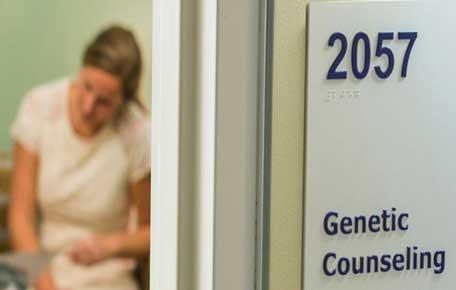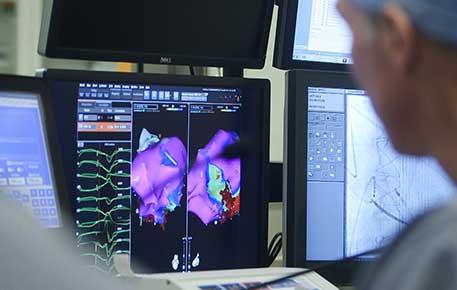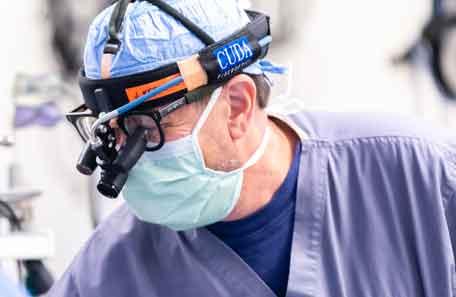Hypertrophic Cardiomyopathy
Make an Appointment
For the Charlottesville area:
For Northern Virginia:
Chest pain, shortness of breath, and dizziness are concerning symptoms. You might feel like you’re going to pass out or your heart is beating too fast. These symptoms can be scary. They could be a sign of hypertrophic cardiomyopathy (HCM).
HCM makes it harder for your heart to pump blood. That’s because your heart muscle gets thicker in some parts, and stiffer in others. That gets in the way of the blood leaving your heart and disrupts how your heart pumps.
HCM Treatment at UVA Health
HCM can cause abnormal heart rhythms, which can be fatal. That's why you want top-rated care. At UVA Health, you'll find a heart care team with expertise in HCM like no other.
We are Virginia's only HCM Center of Excellence, as named by the Hypertrophic Cardiomyopathy Association.
See other awards and recognition for our heart care.
Hypertrophic Cardiomyopathy Treatment Options
We offer heart screenings, genetic testing, and a range of treatment options to help you and your family manage your condition.
It’s likely that if you have HCM you don’t get any symptoms. You might not need treatment. Your doctor might just tell you to avoid hard exercise and sports.
If you do have symptoms, medicines can help. That might include:
- Blood pressure medicine
- Anticlotting medicine (blood thinners)
- Heart rhythm medicine
If medication isn’t enough, surgery might be the next step.
ICD
An implantable cardioverter defibrillator (ICD) helps control your heart rhythm. This device can decrease your risk for cardiac arrest.
Myectomy
This heart surgery can make the heart muscle less thick. That makes it easier for blood to flow.
Heart Transplant
A small number of HCM patients have advanced heart failure. A heart transplant can help.
HCM Research
UVA is leading an international study looking for ways to better predict who is at the greatest risk of heart failure and sudden death from HCM. We received $14.4 million from the National Institutes of Health (NIH) for this study.
If we can better predict who's at risk, we’ll be able to improve treatments for those patients. Get more details about the HCM registry.
Hypertrophic Cardiomyopathy
Hypertrophic cardiomyopathy is a genetic disease that leads to abnormal thickening of the heart muscle, which makes it harder to pump blood and strains the heart.
So hypertrophic cardiomyopathy is the most common genetic heart disease. It's caused by generally a mutation in one of the many contractile proteins in the heart, and what it leads to is, generally, too much heart muscle.
Patients with hypertrophic cardiomyopathy may go their whole lives without any symptoms. Many experience chest pain and shortness of breath. Some can develop syncope or actually pass out from their fast heart rhythms, have palpitations from their fast heart rhythms.
They may be offered an implantable cardioverter defibrillator. For patients who have severe symptoms that are refractory to standard medicines, they may be offered a myectomy which is actually surgery to cut out the thickest part of the heart muscle that's causing a lot of the problems in terms of their symptoms.
How Did I Get Hypertrophic Cardiomyopathy?
HCM is usually passed down in your family (it’s genetic). There’s a problem with the genes that make your heart muscle. Many genes could be affected. But just because you have an affected gene doesn’t mean you’ll get HCM.
With a simple blood test, our genetic counselors can see if your cardiomyopathy is in your genes. They can walk you through your condition and discuss the results of your testing. And they can provide advice for you and your family.
Sometimes, you get HCM just from high blood pressure or aging. Other times, the cause isn’t known.
Traveling to UVA Health for Treatment
Since HCM often runs in families, we'll make every effort to set up appointments with parents, siblings, and children.
If you're traveling from far away, we'll work with you to schedule your appointments at convenient times. Get information about where to stay.
- Genetic CounselingSee our Heart Genetics Team
Genetic counselors can help you and your family understand and manage your heart condition. If cardiomyopathy is affecting you or your family, we can help figure out who is at risk and what to do about it.
- Heart Failure CareTrusted Heart Failure Care
Cardiomyopathy can lead to heart failure. That means your heart can't get oxygen to where your body needs it. Here, our heart failure care specialists offer a holistic approach to improving your daily life.
- Heart TransplantNeeding a New Heart
Cardiomyopathy might mean you're headed for a heart transplant. Whether you need a heart device while you wait for a transplant or a support group for transplant survivors and family, we’re here every step of the way.


